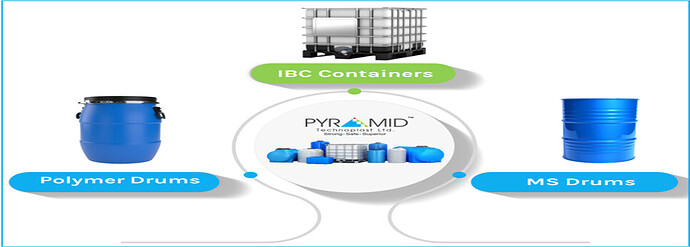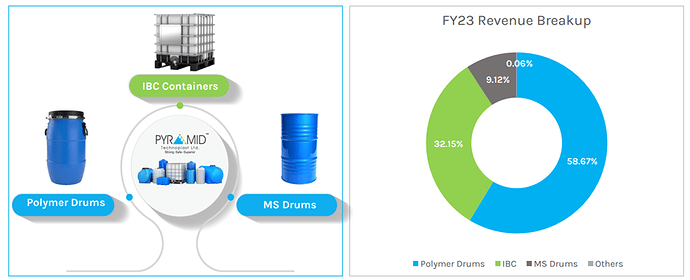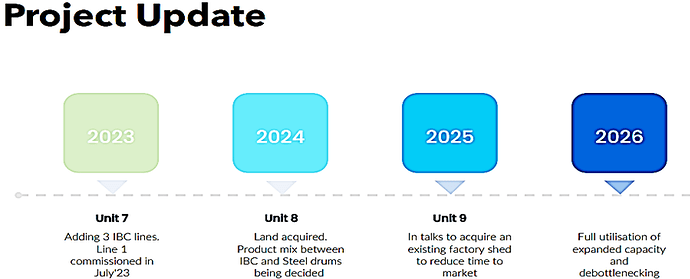Industry Overview
The size of the global intermediate bulk container market, which was estimated to be worth USD 13.5 billion in 2021, is expected to increase from that amount to USD 14 billion in 2022 to USD 22 billion by 2030, growing at a CAGR of 5.5% over the forecast period (2023-2030).
The market for steel drums was valued at USD 11.53 billion in 2022 and is anticipated to grow to USD 18.87 billion by 2030. Steel drums, also referred to as steel barrels, are cylindrical steel storage and transportation containers that are frequently used for a variety of materials.
During the forecast period of 2023–2030, the global steel drum market is anticipated to expand yearly at a promising CAGR of about 5.75%.
The size of the global Plastic Drums market was estimated at USD 2757.95 million in 2022 and is projected to grow at a CAGR of 2.45% during the forecast period, reaching USD 3189.37 million by 2028. Industrial-grade plastic drums made of polyethylene or polypropylene are containers.
The current Indian industry size of plastic barrels is estimated to be around USD 13.13 billion in 2023. It is expected to grow at a CAGR of 9.36% from 2023 to 2028, reaching a value of USD 17.03 billion by 2028.
India’s MS-Drums market revenue is expected to grow at a CAGR of 9.14% from ₹ 280714.74 lakhs in FY22 to ₹ 517794.61 lakhs in FY30
India’s Intermediate Bulk Container (IBC) market revenue is expected to grow at a CAGR of 10.56% from ₹ 4,001,261.80 lakhs in FY22 to ₹ 8,931,901.94 lakhs in FY30
India’s polymer drums market revenue is expected to grow at a CAGR of 9.87% from ₹ 127,584.77 lakhs in FY22 to ₹ 270,937.39 lakhs in FY30
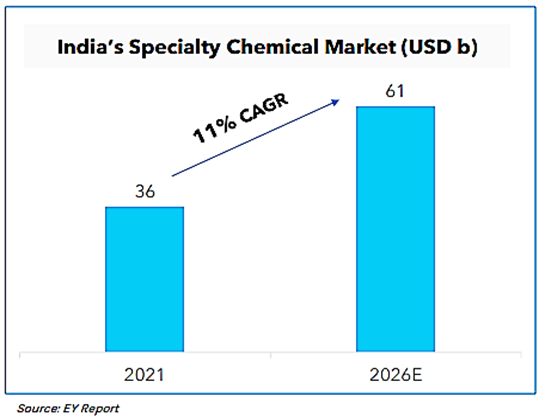
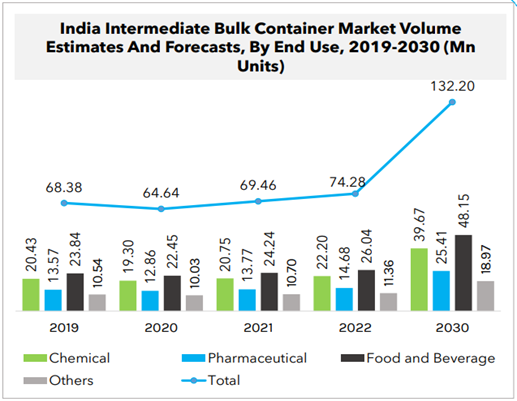
Company Profile
Pyramid Technoplast Limited (PTL), which was founded on December 30, 1997, is a company that produces industrial packaging and specialises in the moulding of polymer-based products, especially Polymer Drums. These goods meet the packaging requirements of businesses involved in chemicals, agrochemicals, specialty chemicals, and pharmaceuticals.
In India, the company is well-known for its production of rigid Intermediate Bulk Containers (IBCs), with a focus on IBCs with a 1,000-liter capacity.
Company also produces MS Drums, which are containers made of mild steel (MS) and designed for the secure transportation of chemicals, agrochemicals, and specialty chemicals.
In 1998, the business commenced commercial production in Unit I. At the moment, it has six manufacturing facilities, of which two are in Silvassa and Nagar Haveli and two are located in Bharuch GIDC. Gujarat is building a seventh manufacturing facility next to the current one.
Pyramid operates across 7 manufacturing units with capacities of 22,818 MTPA for Polymer Drums, 420,000 Units of IBC, and 10,800 MTPA for MS Drums …
Why We Are Studying?
- Pyramid has a 40% market share in IBC in India
- Company Runing at 80% Capacity
- Deleveraging Balance Sheet
- Company Product Mix Shifting to Grow the Margin
- High Inventory Turnover Compared To Peers
- Company Laid Out the Capex for Plant 8 & 9 To Grow Further
- Company in Next 3 Years Plan to Double the Revenue
Business Model
Manufacturing Process
Polymer drums and IBCs are produced by the company using blow moulding technology. Caps, closures, bungs, lids, handles, lugs, and other internal components are produced using injection moulding technology. Pyramid is the brand name used for marketing and sales of its goods.
Manufacturing Unit
With an industry-leading asset turnover of about 5x, all plants are running at between 75% and 80% of their potential.
Product Portfolio
IBC Containers:
Plastic Barrels:
MS Drums:
Clientele
Asian Paints, Adani Wilmar, Patanjali, JSW, Deepak Nitrate, Unites Phosphorous, GACL , etc. are the key client of the company. In the most recent fiscal year, they provided services to about 376 clients.
Revenue Split
Competitive Strength
- The company provides Polymer Drums, IBCs, and MS drums to meet the bulk packaging needs of its customers from a variety of industries, including chemicals, agrochemicals, pharmaceuticals, lubricants, and edible oil.
- The business has developed relationships with numerous clients in these industries over the years and has continued to provide them with its product offerings. During the last three financial years, the company regularly served more than 376 customers.
- In order to transport dangerous goods safely (by road, rail, sea, and air), the company has obtained UN certification for IBC and MS Drums.
- 75%-80% Business Recurring
- Import of IBC is Not Possible as the transportation cost is higher
- Pyramid has a 40% market share in India , and the company is concentrating on value-added products like IBC by expanding existing facilities.
- The development of the Indian paint and chemical industries is anticipated to be favourable for the IBC segment. The company has no seasonality, and revenue is distributed fairly throughout the year.
Future Outlook
- Chemical sector demand has picked up in Q2. Volume outlook strong.
- For proposed Unit 8 and Unit 9, the capex budget is between Rs. 40 and 50 crores (FY24–FY26). There will be a five-fold asset turnover. Plans and configuration for Unit 8’s Capex are being considered. Unit 9 is considering a number of locations.
- For the IBC plant, the company recently put Line 1 into service. The company’s main goal is to make metal drums more automated.
- Within three years, the company hopes to have doubled its revenue. A 25% return on equity is what the company wants to keep maintaining. A focus is being placed on growing the IBC segment’s market share
- Expecting that in the next three years our revenue will come from 40% IBC, 50% from plastic drum and 10% from metal drum
- The development of the Indian paint and chemical industries is anticipated to be favourable for the IBC segment.The company has no seasonality, and revenue is distributed fairly throughout the year.
Disc : For Learning No Buy Sell Rico****

